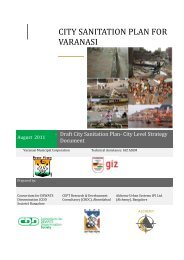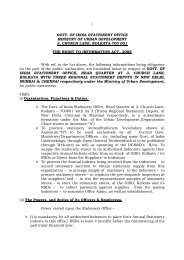CITY SANITATION PLAN - Ministry of Urban Development
CITY SANITATION PLAN - Ministry of Urban Development
CITY SANITATION PLAN - Ministry of Urban Development
Create successful ePaper yourself
Turn your PDF publications into a flip-book with our unique Google optimized e-Paper software.
<strong>CITY</strong> <strong>SANITATION</strong> <strong>PLAN</strong> BAREILLY<br />
Sensitize citizens for adopting water wastage minimization, segregation & management <strong>of</strong> solid<br />
waste and open defecation free practices through IEC campaign.<br />
By working at both the levels mentioned above a culture <strong>of</strong> communications and consultations is<br />
fostered leading to participation.<br />
Methodology: Bareilly is a prominent city <strong>of</strong> UP state. The city faces specific challenge <strong>of</strong> Water and<br />
Sanitation services. This pose challenges to the city administration with respect to water supply, toilets,<br />
solid waste management and storm water drainage. It is found that communication strategy is a crucial<br />
element in improving service delivery standards. However, apart from educating citizens on health and<br />
hygiene, improving municipal processes by way <strong>of</strong> citizen consultation and participation remains a<br />
necessary goal; without citizen inputs right from the design stage to implementation <strong>of</strong> water and<br />
sanitation projects risk failure.<br />
Communication needs assessment identified three stages for implementation <strong>of</strong> Information, Education<br />
and Communication strategy for improvement in water and sanitation services. These are 1) Awareness,<br />
2) Process and 3) Compliance. While it is generally understood that these stages would lead to better<br />
citizen participation in the schemes, it is in fact imperative for all stakeholders to be appraised <strong>of</strong> them<br />
from their own specific stand points. Awareness includes an understanding <strong>of</strong> health and hygiene<br />
related education specifically directed towards slums. Equally important is an awareness <strong>of</strong> municipal<br />
<strong>of</strong>ficials about the problems face by all the city residents including slum & middle class households and<br />
sanitation workers. This awareness is generally taken for granted. Here, we propose that open and<br />
specific appraisals be carried out without assuming too much <strong>of</strong> prior knowledge regarding sanitation<br />
issues. Next is to create processes which are essential to maintain improved services. These could<br />
include citizen participation in community toilet maintenance, outsourcing <strong>of</strong> operations and<br />
maintenance to private partners in public toilets, solid waste management and establishing citizen<br />
grievance resolution systems to name a few. A consolidation <strong>of</strong> these gains can only occur when all<br />
stakeholders comply with the laid down norms. As system <strong>of</strong> incentivizing desirable behaviors and<br />
weeding out undesirable behaviors must be developed, these programmes, processes and goals will be<br />
set by the Nagar Nigam.<br />
ADMINISTRATIVE STAFF COLLEGE OF INDIA, HYDERABAD Page 23
















